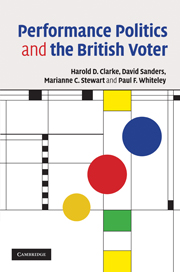Book contents
- Frontmatter
- Contents
- List of figures
- List of tables
- Acknowledgments
- 1 Performance politics and the British voter
- 2 The theory of valence politics
- 3 Valence politics and the long campaign
- 4 Tony's war
- 5 Electoral choices
- 6 The short campaign
- 7 Voting and political participation
- 8 Performance, people and the political system
- 9 Performance politics reconsidered
- Appendix A Vote in 2005 by socio-demographic characteristics
- Appendix B Turnout by socio-demographic characteristics
- Appendix C Dynamics of party identification
- Notes
- Bibliography
- Index
1 - Performance politics and the British voter
Published online by Cambridge University Press: 06 January 2010
- Frontmatter
- Contents
- List of figures
- List of tables
- Acknowledgments
- 1 Performance politics and the British voter
- 2 The theory of valence politics
- 3 Valence politics and the long campaign
- 4 Tony's war
- 5 Electoral choices
- 6 The short campaign
- 7 Voting and political participation
- 8 Performance, people and the political system
- 9 Performance politics reconsidered
- Appendix A Vote in 2005 by socio-demographic characteristics
- Appendix B Turnout by socio-demographic characteristics
- Appendix C Dynamics of party identification
- Notes
- Bibliography
- Index
Summary
In December 1981, Charles Frost was a worried man. The small engineering company that he owned and ran was suffering severely from a decline in export orders, largely as a result of the high value of sterling against other currencies. He was already laying off some of his workers and he was not sure whether the company, which his father started in 1951, would survive another year. He was particularly disappointed with Margaret Thatcher's Conservative government. Mrs Thatcher had promised to pursue a rigorous ‘tightmoney’ policy that would squeeze inflation out of the British economy and restore its international competitive position. As he contemplated a difficult winter, Frost could not help feeling that she had somehow lost her way. The trust that he had placed in her economic and political judgment was ebbing fast. Perhaps her confident pronouncements about the virtues of monetarism were little more than hot air. He grew even more alarmed in April 1982 when Thatcher despatched a large naval task force to deal with the Argentine invasion of the Falkland Islands. How could the objectives of such a force possibly succeed when most of the Third World, and much of the developed world, appeared to sympathize with Argentina's claims to sovereignty over the islands? Frost was as surprised as anyone when, by the summer of 1982, it was clear that British forces had achieved a rapid and overwhelming victory in the conflict. There were also signs that the British economy was beginning to respond positively to the dose of monetarist medicine that had been administered by Thatcher's chancellor Geoffrey Howe.
- Type
- Chapter
- Information
- Performance Politics and the British Voter , pp. 1 - 29Publisher: Cambridge University PressPrint publication year: 2009
- 2
- Cited by

